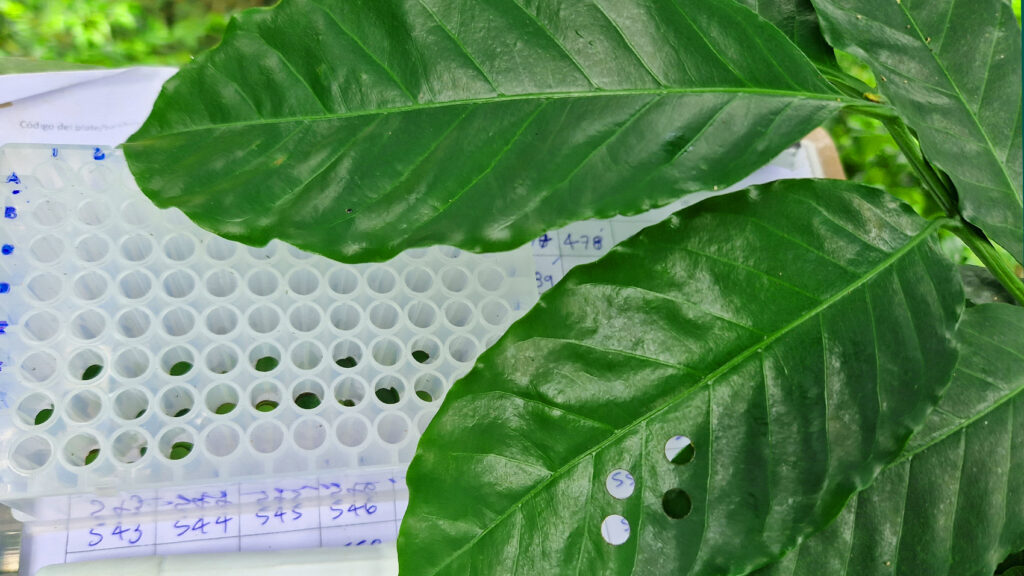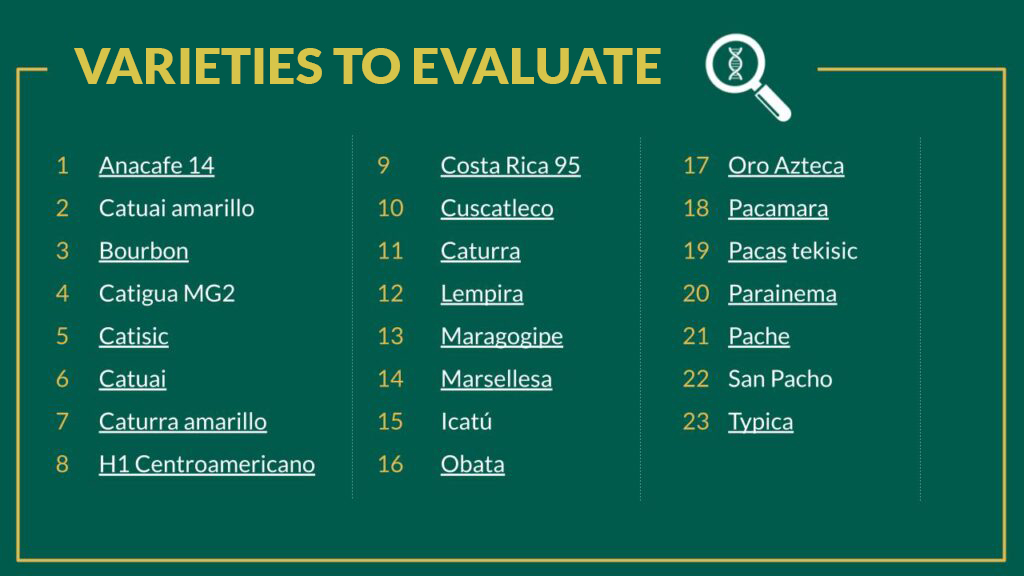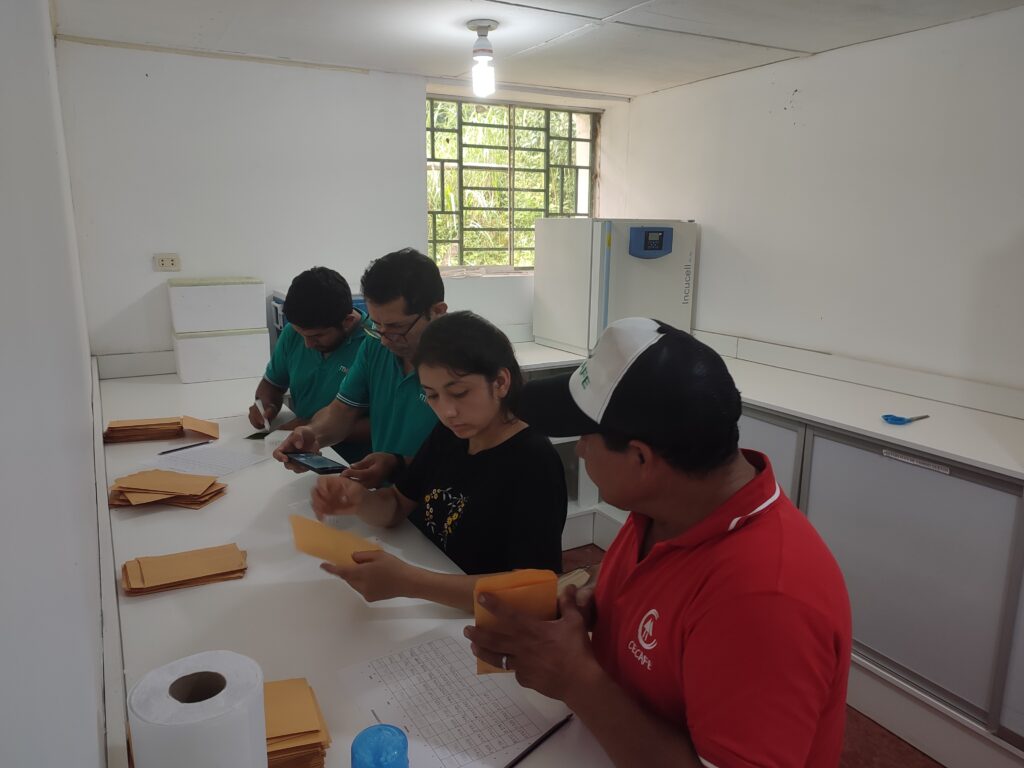- CheckCAFE Program will provide technical assistance and verification of genetic conformity to coffee nurseries in 5 countries.
CheckCAFE is a training program for nurseries that aims to improve existing capacities in nurseries, especially traceability control points and good agricultural practices, contributing to increasing the supply of quality plants for coffee producers. The program will be implemented from October 2023 to December 2024 in the countries that are part of the area of influence of the MOCCA program (Guatemala, El Salvador, Honduras, Nicaragua and Peru).
MOCCA is a 7-year initiative funded by the United States Department of Agriculture (USDA) through its Food for Progress Program, which seeks to improve agricultural productivity and expand trade in agricultural products. The MOCCA project is being executed by a consortium led by TechnoServe. mientras que World Coffee Research (WCR), lidera los esfuerzos de investigación en café. World Coffee Research leads the research activities.
The program is aimed at two types of participants. The first type consists of the continuity of the work that began with WCR Verified (2021-2022), through which large ones were verified in 2022, while in this second stage, through CheckCAFE, new nurseries will be incorporated with a annual offer of more than 100 thousand plants and who want to improve their capacity to manage traceability processes and Good Agricultural Practices, nurseries to which DNA analyzes will also be carried out on their varieties.

Specialized technical assistance and genetic conformity verification
The training process for nurseries that participate in the program will consist of monitoring and monitoring compliance with traceability control points and Good Agricultural Practices (GAP), with the following phases:
- Initial in-person diagnosis to determine the baseline according to compliance with the traceability control points.
- Preparation of an action plan according to compliance with the traceability and GAP control points, found in the initial diagnosis.
- Second diagnosis, to determine compliance with the action plan.
- Final in-person diagnosis to determine the level of progress towards compliance with the action plan.
The tool being used for the application of the diagnosis is a checklist based on ISO 17065 (also known as ISO/IEC 17065), which is a standard published by the International Organization for Standardization to provide a common set of standards and practices for organizations that provide evaluations and certifications.
The checklist includes control points to evaluate both in the field and available and required documentation, related to substrates, containers, safe handling of agrochemicals, quality control and traceability in germination, transplant, growth and development of plants, genotypic verification, sale and plant office.
Checkpoints
Of the mentioned control points there are four ways to measure compliance: minor, major, critical and knock out, where the critical control points are closely related to compliance with the origin of the seed and the traceability of both the seed and the plant. , and the knock out is a control point that measures the genetic compliance of the plants through the genetic verification that will be carried out on each of the varieties.
The genetic verification process will be carried out in the field, and will be carried out by the WRC team in each country. At the time the final diagnosis is applied, 25 samples per variety will be collected, which will subsequently be prepared and sent to the laboratory for analysis. using the individual SNP’s methodology, to identify their genetic purity; Once they are analyzed in the laboratory and the results are received, they will be delivered to the owner of the nursery.

Selection criteria
100% commercial nurseries
- Annual production capacity, at least 100,000 plants per year.
- Medium to high level of technology.
- There must be personnel available in the nursery to carry out the improvements that the nursery requires.
The implementation of this program seeks to contribute to the improvement of the accessibility and availability of quality plants in the MOCCA countries, through the production of plants that comply with genetic traceability and GAP control points, in the nurseries. of the countries of the region.
Duties and responsibilities of both parties:
WCR:
- Review registration form and participant selection criteria.
- Call a meeting with each of the participants to explain the work plan and the agreement between both parties, then proceed to sign it.
- Scheduling of visits for the application of diagnoses.
- Prepare and present the action plan, according to what was found as a continuous improvement plan.
- Monitor the progress of action plans.
- Collection of samples for DNA analysis.
- Present the results of the last diagnosis and DNA analysis.
- The WCR, with the MOCCA program, will take care of the costs of materials for sample collection.
- The WCR will assume food and lodging costs for WCR field staff.
Nurseries:
- Show your interest in participating in the program by filling out the registration form.
- Participate in the meeting to present the work scheme.
- Sign the participation agreement.
- Have a work team based on compliance with the action plan.
- Guarantee compliance with the action plan.
- Accompaniment to the WCR team on the visits made.
- Guarantee the transportation of WCR equipment to the nursery facilities.
- Activities that require investment on the farm are assumed by the owner of the nursery.

Ways to apply to the process and selection of participants:
- Access the registration form through a link that will be posted on the MOCCA website and social networks, where the interest in participating in the CheckCAFE program is registered and a registration form is filled out. (Google forms)
- Contact TechnoServe teams in each country to express your interest as a potential participant and TechnoServe will pass contact information to WCR.
- Contact the WCR team directly at the emails (jesslin@worldcoffeeresearch.org) to fill out the registration form.
In the months of November (CA) and December (Peru), applications for participation will be reviewed where each of the selection criteria to participate in the program will be taken into account.
Once the WCR team has reviewed all the profiles and selection criteria of the participants, it will call a 1-on-1 meeting with the participants to present the work plan to be carried out.
Accepting the duties and responsibilities of both parties, the agreement or letter of understanding is signed.







